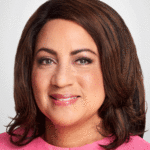This video is no longer available.
In WTOP’s series “Parenting Your Parents,” reporter Sandra Jones delves into a difficult task many adults will eventually face — taking care of their parents.
Here in Part 1, Jones opened up about how she took on the difficult role of helping her mom cope with illness in her last days.
You may now be faced with handling what could be one of the most difficult tasks of your life — taking care of your parents. Many adult children know it’s inevitable as their parents get older, but it can often feel unexpected when that day finally arrives. Are you prepared, emotionally or financially, to take on the role of caregiver?
My mom, Linda B. Jones, was one of a kind. She was a vibrant woman who enjoyed life to the fullest. She loved to cook and always kept a clean house. But taking care of her family was number one.
But we never imagined the roles reversing. It started after mom suffered from several mild strokes in January 2022.
That was the first sign that she needed more medical attention. Her primary care physician recommended that she see a specialist. Neurologists diagnosed her with cerebral amyloid angiopathy in 2023. It’s a disorder that causes dementia.
When my mother’s condition worsened, me, my father and my younger siblings had to step in and help her with grocery shopping, cooking and other chores around the home, as she underwent physical and occupational therapy.
- Read Part 2 of WTOP’s series, “Parenting Your Parents,” where Jones talks to experts about managing your parents’ finances.
- Read Part 3 of WTOP’s series, “Parenting Your Parents,” where Jones talks to experts about saving ahead for assisted living care.
But my mother remained steadfast and upbeat despite her condition. It’s not always the case for other parents, who might find it difficult to give up their independence.
“You may be providing full hands-on care for someone to meet their personal needs,” said Amy Goyer, a caregiver expert with AARP, an organization that advocates for people who are over the age 50.
Goyer said that one of the first things to do is set up a power of attorney for your parents regarding their health care. That’s a legal document that allows someone else to act on another person’s behalf. This will allow your parents’ doctors to talk directly with you.
“They’re going to talk to you differently and they’re going to feel that they can tell you some things that they wouldn’t tell you otherwise. You’re loved ones can sign release forms that say it’s OK to talk to you about that,” Goyer said.
Before you meet with doctors, bring a list of questions. Ask them, “How do you think my loved one’s doing? What’s the prognosis? Do you think this is a possible treatment course? She doesn’t seem to be doing well with this medication, is there an alternative?”
Goyer said if have questions about a certain treatment that you think your loved one should have, bring information about that too.
“Be prepared in that sense. I think it’s always wise to have a good medical history, a complete medication list, including any vitamins and supplements they’re taking, any test results you want to discuss with the doctor,” Goyer said.
You should also start preparing the house your parents are living in before you take on the role of caregiver, such a getting a thorough safety evaluation around the entire home.
Goyer pointed out that lighting is important.
“It’s the last thing people think about, but it’s one of the biggest causes of falls because people can’t see where they’re going,” she said.
Some areas to focus on include the stairwell, the hallway foyer leading to the front door, and outside in the front and back of the home.
Goyer also said to make sure there’s enough light leading to the bathroom, so they can see where they’re going.
She recommended getting rid of throw rugs, adding handrails in the bathroom and staying away from step ladders and stairs.
“Some people have lifts put in their homes, really simple lifts or elevators. And that makes their home stay safe longer,” Goyer said.
Get breaking news and daily headlines delivered to your email inbox by signing up here.
© 2024 WTOP. All Rights Reserved. This website is not intended for users located within the European Economic Area.








